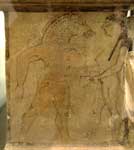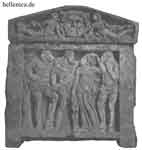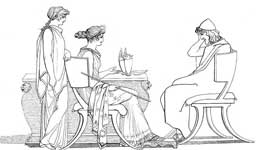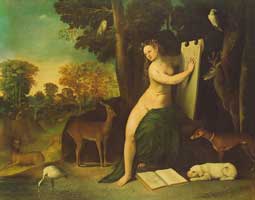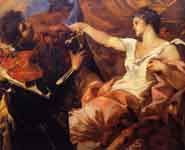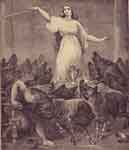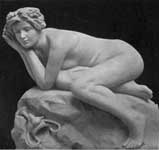.
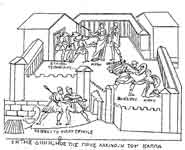
In Greek mythology, Circe or Kirkê (Κίρκη ) was a goddess living on the island of Aeaea.
Circe's father was Helios, the pre-Olympic titan of the Sun, and her mother was Perse, an Oceanid; she was sister of Aeetes, the king of Colchis and of Pasiphae and Aga. She transformed her enemies, or those who offended her, into animals through the use of magical potions. She was renowned for her knowledge of drugs and herbs.
In Homer's Odyssey, her home is described as a stone mansion standing in the middle of a clearing in a dense wood. Around the house prowled lions and wolves, the drugged victims of her magic; they were not dangerous, and fawned on all newcomers. Circe worked at a huge loom. She invited Odysseus' crew to a feast, the food laced with one of her magical potions, and she turned them all into pigs with a wand after they gorged themselves on it. Only Eurylochus, suspecting treachery from the outset, escaped to warn Odysseus and the others who had stayed behind at the ships. Odysseus set out to rescue his men, but was intercepted by Hermes and told to procure some of the herb moly to protect him from the same fate. When her magic failed he was able to force her to return his men to human form. She later fell in love with Odysseus and assisted him in his quest to reach his home after he and his crew spent a year with her on her island.
According to Homer, she suggested to Odysseus two alternative routes to return to Ithaca: either toward the "Wandering Rocks" (the pumiceous Lipari Islands; in the 13th-century Chinese travel notes of Chou Ju-kua they are called similarly), where King Aeolus reigned. Or, to pass between the dangerous Scylla and the whirlpool Charybdis, conventionally identified with the Strait of Messina.
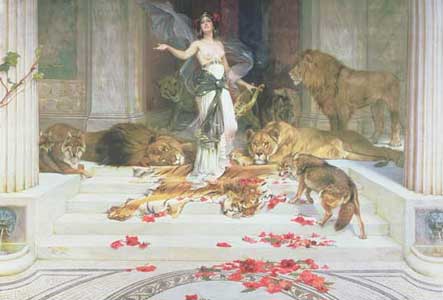
Circe, Wright Barker
Almost at the end of Hesiod's Theogony (1011f) we find that Circe bore of Odysseus three sons: Agrius (otherwise unknown), Latinus, and Telegonus who ruled over the Tyrsenoi, that is the Etruscans.
Later poets generally only speak of Telegonus as Odysseus' son by Circe. When grown to manhood, later poets reported, she sent him to find Odysseus, who had long since returned to his home on Ithaca, but on arrival Telegonus accidentally killed his father. He brought the body back to Aeaea and took Odysseus' widow Penelope and son Telemachus with him. Circe made them immortal and married Telemachus, while Telegonus made Penelope his wife.
Dionysius of Halicarnassus (1.72.5) cites Xenagoras the historian as claiming that Odysseus and Circe had three sons: Romus, Anteias, and Ardeias who respectively founded three cities called by their names: Rome, Antium, and Ardea.
That Circe also purified the Argonauts for the death of Apsyrtus may be early tradition.
In later tales Circe turned Picus into a woodpecker for refusing her love, and Scylla into a monstrous creature with six dogs' heads when Glaucus (another object of Circe's affection) declared his undying love for her. She had one daughter: Aega.
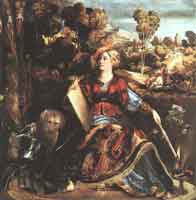
Circe and Ulysses , Edmund Dulac (1882-1953)
Judith Yarnall, Transformations of Circe: The History of an Enchantress. Urbana: University of Illinois Press, 1994. ISBN 0-252-06356-2. Review
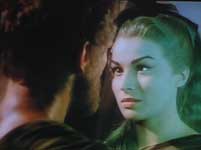
Silvana Mangano as Circe and Penelope in the Ulysses 1955 Film
Links
- Tales of Circe (http://www.geocities.com/medea19777/circe.html)
See also : Greek Mythology. Paintings, Drawings
| Ancient Greece
Science, Technology , Medicine , Warfare, , Biographies , Life , Cities/Places/Maps , Arts , Literature , Philosophy ,Olympics, Mythology , History , Images Medieval Greece / Byzantine Empire Science, Technology, Arts, , Warfare , Literature, Biographies, Icons, History Modern Greece Cities, Islands, Regions, Fauna/Flora ,Biographies , History , Warfare, Science/Technology, Literature, Music , Arts , Film/Actors , Sport , Fashion --- |
Retrieved from "http://en.wikipedia.org"
All text is available under the terms of the GNU Free Documentation License



